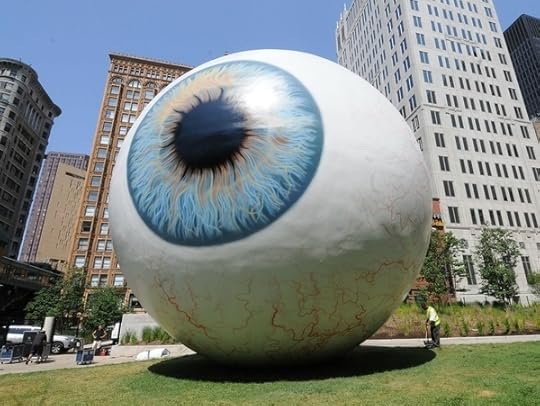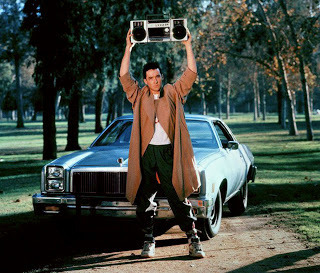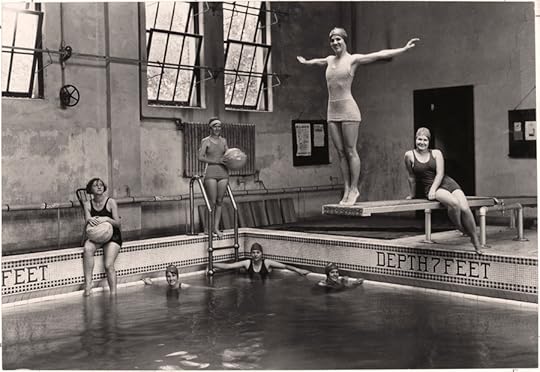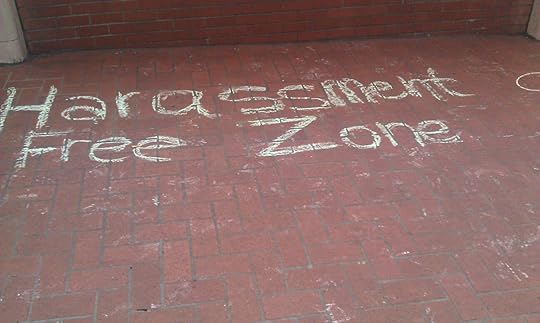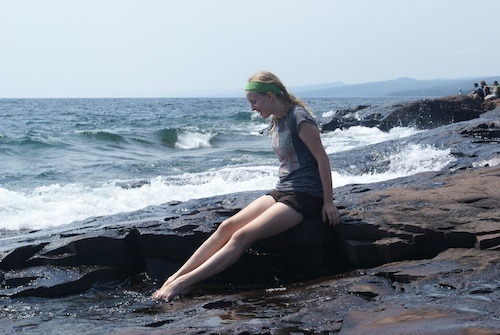Kelly Barnhill's Blog, page 9
September 24, 2013
My Eight-Year-Old Son on Junot Díaz: a transcription.

Sometimes, my kids will throw bits of the world at me – tiny nuggets of information hoarded and hidden for later, possibly aggressive, use. They are like squirrels gathering acorns for the sole purpose of hurling it at my head when I least expect it. For example, here’s a conversation, in its entirety, that I had with my son this weekend.
LEO: Mom. Is Junot Díaz a writer?
ME: (stares for a long time at my son, trying to figure out how the hell he knows who Junot Díaz is) Um. Yes?
LEO: Okay. (balls up hands into little triumphant fists) I knew it!
ME: Why the sudden interest in Junot Díaz?
LEO: Do you know him?
ME: Who?
LEO: Junot Díaz.
ME: No.
LEO: (looking truly sorry) Oh. That’s too bad.
And then he left the room. And I was mystified.
Five minutes later.
LEO: Did Junot Díaz write This Is How You Lose Her?
ME: Leo.
LEO: What?
ME: How do you know who Junot Díaz even is?
LEO: (a long-suffering expression) Everyone knows who Junot Díaz is. Gosh, mom.
(Five minutes later)
LEO: Mom. Who’s your favorite writer?
ME: No idea, honey. A lot of writers are my favorite writer.
LEO: Is Junot Díaz your favorite writer?
ME: (I am absolutely going nuts at this point) What is up with your recent Junot Diaz obsession?
LEO: (ignoring me) Junot Díaz is my favorite writer. I think he should be your favorite writer too. I think you should write like Junot Díaz and then you can be more famous.
ME: Hmmm. How do you mean.
LEO: On the first page of This Is How You Lose Her, there are three swear words. Three, mom. Real swears. In a book. A real book.
ME: Who taught you to read, anyway? No more reading.
LEO: (ignoring me again) If you write like Junot Díaz, then you’ll probably get way more famous. Swears, mom. Real swears. In a book. I didn’t know it was allowed. And if you are more famous then I can have an Ipad.
ME: I see. Cogent arguments, my son. I’ll take them under advisement. And remind me to lock up the books.
LEO: You can’t lock up books mom. They’re escape artists. Everyone knows that.
Later, I was cleaning up his room and I found my copy of The Stand under the pile of hard-worn shorts and tee-shirts and socks. And The Arsonist’s Guide To Writer’s Homes in New England.
LEO: Mom. What does Arsonist mean?
ME: Someone who arranges flowers for a living.
LEO: Are you sure?
ME: It comes from the latin word arse, which means delicate flower.
LEO: I don’t think that’s right. Are you tricking me?
ME: Go to your room.
If the house catches on fire, I have only myself to blame. And also my son. Obviously, I instantly rid my house of any hint of Chuck Palahnuik from my house. And Clockwork Orange has to go. Mr. Burgess and Mr. Zola as well. And everything Russian. I can’t tell if my son is transfixed by grownuppy books because he wants to be like his parents, or if he is actually up to something.
What am I saying? This is Leo. He is clearly up to something. I must now plan for a book-free household. It is clearly my only option.
If I have more children, I am for sure not teaching them to read. And that’s final.
Filed under: Uncategorized Tagged: Junot Díaz, raising boys, Writer


September 23, 2013
A friendly note to the gentleman who nearly killed me today. (Caution: Contains swearing.)
Dear Sir,
I can only assume that the text message that you were avidly sending was far more important than safely transporting yourself from point A to point B. (Where were you coming from, and where were you going? Home to work, and back again? Are there people that will miss you in either place? Are there people who would reject you if you had, as you nearly did, become a murderer?)
I am the woman in the red minivan – the Very Nice Mom – that you nearly murdered today. There were four kids in the car as well – Nice Children, all.
Look. You can’t pretend that you weren’t texting. You were. I know you were. I can see it a mile off. I can see the telltale swerve, the lack of spacial awareness, the sudden loss of speed control. I can tell by the ghastly pallor thrown upon your face by the tiny but powerful screen’s ghoulish glow. And really, that’s a blessing. Because I was ready for you.
Had I not been – had I not been prepared to employ my well-trained Jedi Mom Car Tricks (there are special schools. every mom in a minivan is well versed in how to turn their cars into physics-defying, futuristic bits of magic. But perhaps you knew this. Perhaps this is why you didn’t care to be safe.) – you surely would have slammed your sedan into the side of my car, sending me off the bridge. It nearly happened. Here is who you might have killed.
1. A Very Nice Mom. She bakes cookies and cooks excellent soup and welcomes strangers into her home and makes them feel welcome. She tells jokes and writes books and loves her neighbors and is loved in return.
2. Four Very Nice Kids. These kids, of course, both outnumber and outweigh the Very Nice Mom. They are precious – both to me, and to the world. And they should be precious to you. These kids are the ones who may restart your stopped heart on the operating table someday. Or invent the drug that restores your granddaughter’s sight. Or write the book that makes you believe in God again. Or marry your nephew. Or spoon soup into your withered lips during your last, waning days of life. But you don’t care about that. Your text, apparently, was far more important.
Look. I get it that you’re afraid – afraid of loneliness, afraid of inadequacy, afraid of irrelevancy. I understand your fears. There should be another fear at play though. Fear of assholery. Because make no mistake: you are a fucking asshole. I do hope that’s clear.
You went careening from one side of the freeway to the other as you went flying out of the cloverleaf entrance. You did not look. You did not care. You nearly killed us, but I was faster, smarter, and more nimble. Yay, me. What you did, sir, can only be classified as a dick move. And I hate you for it.
Look, you are not alone. There are other assholes. Hell, I counted eight on my drive home. But make no mistake. IF YOU TEXT AND DRIVE YOU ARE A FUCKING ASSHOLE. And if you harm another person while texting and driving, you are a fucking asshole forever. And I fear this is in the cards for you, sir. I mean, Dick.
Fuck you.
Love,
Kelly
Filed under: Uncategorized Tagged: family, jedi mom, Minivan, parenting, Raging Mama, texting and driving


September 19, 2013
Dear Elementary School Reading Teachers and Librarians – I need your help
We interrupt my unbelievably lackadaisical posting habits of late to send out a sincere and desperate plea to teachers and librarians who have used, or are using, or are familiar with the SRA Reading Mastery curriculum by McGraw-Hill. My son’s school switched over to it last year, and it has been extremely rough around these here parts. He went from reading novels on his own (Dahl, Gaiman, Rowling, Sachar) to coming home from school saying “I’m too stupid to read”.
And then my head exploded.
Now, as his mother, it is easy for me to blame the curriculum – and maybe to do so is valid. The problem, however, may not be the curriculum itself, but rather an ill-defined and poorly-execcuted interpretation of that curriculum in this particular school – one that could absolutely be remedied by additional teacher training and alternate strategies. I know from my teaching days that it takes a while to work out the kinks in a curriculum, and I have TONS OF COMPASSION for the dedicated teachers laboring in the fields, trying to make it work.
Still.
No child should come home saying things like that. And I will not have it. Not in my house. Not with my child.
What I would like to know from any of you who can help me is this:
What are your thoughts about this program? What works? What doesn’t?
What are the strategies you use in your building for kids who get stuck? In our experience, Leo became so demoralized that he was forced to repeat the same lesson over and over because he wasn’t able to get it at 100% accuracy – for a month. This seems crazy to me. And he wasn’t alone. What do you do for your kids to keep that from happening?
I know the program focuses on fluency as the sole indicator of good reading. What additional strategies do you use to supplement – to make sure that your kids are also demonstrating the other indicators of good reading – inference, analysis, criticism, intertextual connections, reasoning, etc.?
From what I understand, this program is really expensive. Is it worth it?
My main criticism of this curriculum is that it seems utterly devoid of joy. What are you doing in your classroom to build joyful readers?
If you are not a teacher or librarian, but know someone who is, please send this on. I’m really trying to gather as many perspectives as I can in anticipation of a meeting I have with the Administration, as well as several conversations that I will be having with different members of the Board. Also, if this curriculum has been used in your child’s school, I’d love to hear your perspective as a parent.
Thank you all so much, and I promise to resume my random posts about random stuff very soon.
Much love,
Kelly Barnhill
Filed under: Uncategorized Tagged: Curriculum, Educators, Librarian, Library, McGraw-Hill, nova classical academy, School library


August 30, 2013
We interrupt this final Friday of summer vacation to bring you this GIANT EYE.
There is, right now, a giant eyeball in Dallas.
I can’t tell if the artist who designed this is the sort of fellow who frightens small boys off his lawn with rakes and chainsaws and kicks the occasional puppy with his steel-toed boots, or if he is destined to be my very best friend in all the land. Maybe both. What kind of genius/madman comes up with this kind of nighmarish nugget of awesome? This monstrous delight? What kind of person painstakingly copies, then magnifies his own peepers and puts them on display? And more importantly, is he fun to have over at dinner parties? (Seriously, Tony Tasset, you’re welcome any time.)
A giant, goddamned, eye. What will they think of next?
Spend five minutes staring into that mammoth pupil and….oh, rats. I think it just swallowed my soul. Also? I’m pretty sure I know what Hell is like. Heaven too (same thing, really – two sides of a single coin, darkness and light, matter and wave, hello and goodbye, the vastness of space and the singularity of time, and oh, god, my soul, my soul, my shattered soul). Anyway, what was I saying? Oh, right. The giant eye.
Apparently, this ocular glory/horror was once stationed in Chicago (I’ve been to Chicago; the eye is appropriately bloodshot and bleary), but was recently purchased and positioned temporarily in the State With Which One Must Not Mess. I’ve been to Dallas, too. As I recall, it was rather thin in the art department, for a city of it’s size (of course, as a Minneapolitain, I am spoiled, art-wise). Perhaps they were simply waiting for a Sculpture the Size of Texas. It’s three stories tall. That’s a lot of art, if you think about it
Or, perhaps Texas is secretly Mordor, and you can’t have Mordor without the eye of Sauron. Perhaps there are, in the teeming guts of Dallas, hordes of Orcs and Uruk-hai and a whining Smeagol and perhaps even a giant spider, biding their time and massing their forces to unleash themselves upon the world. I’ve always wanted to visit Mordor.
And dangit. Now I want to go to Texas.
Perhaps I might locate my swallowed soul.
(ETA- Yes, I know, the picture here is from the previous installation. Is it my fault that Chicago is more photogenic than Dallas? No my friends, it is not. And speaking of the artist possibly being my new best friend, he also made this:
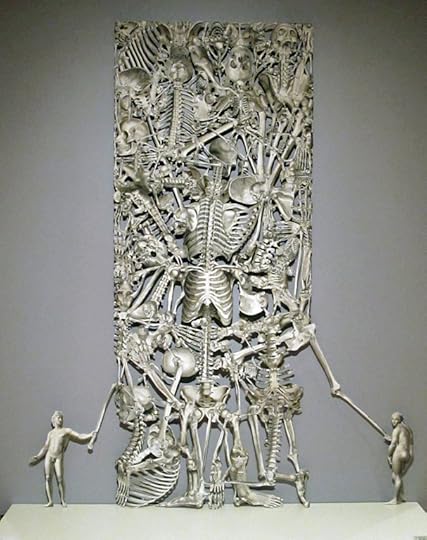 And this:
And this:
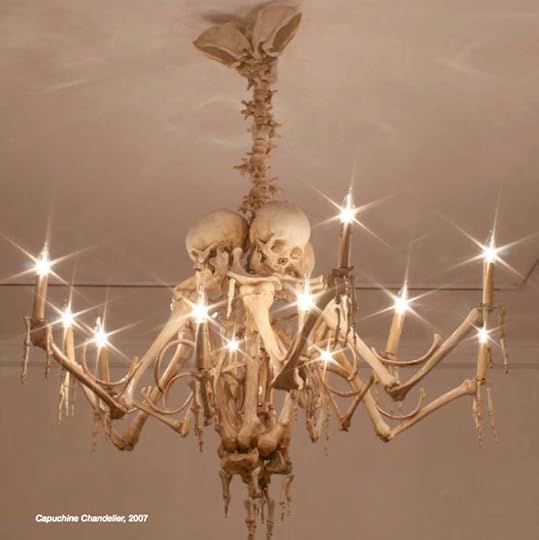 Seriously. New best friend. He just doesn’t know it yet.)
Seriously. New best friend. He just doesn’t know it yet.)
Filed under: Uncategorized Tagged: a giant goddamned eye, art, Mordor, surreal, Tony Tasset


July 20, 2013
Every day I fall madly in love with someone.
I can’t help it. My heart races and leaps. I am glitter and breeze and sunsets and clouds. I am stardust and radiation and Dark Matter and inexplicable time and the Big Bang. I have told my husband that this is normal. He will believe me one day. When we are ninety, or thereabouts.
This is who I fell in love with today:
He was a skinny thing, all elbows and reeds. A long neck. Sharp chin. Pale skin like milk. Thick black leg hairs standing straight out, as sure as tree trunks. He was wearing black gym shoes and black socks stretched to the middle of his bony calves, long shorts, and a tee- shirt with Phil Collins on it. He had a red white and blue sweat headband around his head and trucker-shaped sunglasses with white, plastic frames balancing on his long, straight nose and another pair of sunglasses on his head just in case. And he had a boom box. One of those ancient magnavox numbers with the double tape deck that I remember asking for Christmas the year I turned eleven.
(I didn’t get it, by the way. Thanks a lot, Santa.)
The boom box was turned all the way up. Peter Gabriel. Of course.
I was on my way to the library to get work done out of the chaos of my house, and I couldn’t stop. But I wanted to. He sat down on a low wall under a tree, his boom box balanced on his pale, bony knees. And I wanted to sit next to him and take his hands.
Here, I would say. This is your life line. And this is your head. And this is your heart. And my heart. And everyone’s heart.
Here. My fingers curling into his, my eyes bright, my lips curled into a smile. Skin and bone, breath and thought. The vastness of space. The beauty of the atom. Your perfect soul. My mind is inscrutable. It is burning and storming and wild. It is a cosmic wind, blowing from one end of the universe to the other, looping inside itself like a snake swallowing its tail, forever and ever and ever.
Here. My life and my love. I have known you before. I will know you again. Every moment happens simultaneously with every other moment, every life harmonizes with every other life. We are linked. We are song. We are the woven roots of the endless grass. And we are all one.
But I had work to do. The light turned green. I adjusted my backpack and headed into the library and left him behind in the shade. He didn’t notice me. He didn’t need to.
(Incidentally, I also fell madly in love with the elderly gentleman playing the Steinway in the workroom next to mine at the library. And now I have my eye on a broad shouldered woman cupping her hands around her eyes as she stands at the bus station. This happens a lot. I am large. I contain friggin multitudes.)
And now I shall pour that love into the work. It is not a bad thing. It bubbles and flows. It is a river. It is the rain. It is the swelling ocean. Who have you fallen in love with lately?
Filed under: Uncategorized Tagged: cosmology, Dark Matter, Love story


July 18, 2013
A history of water
I have this memory of swimming lessons when I was a child. We were at the Blaisdell Y in Minneapolis. The floor surrounding the pool was made of small tiles fitted neatly together and patterned in bright, seventies colors – turquoise, orange, brown, yellow. The walls were painted cinderblock, slicked with the damp clouds of chlorine and water and ringing with the shouting of children. I remember trying to slide my arms into my swimming suit (pink, with red and green flower appliqués). I remember the sound of my chattering teeth, my short hair clinging to my face in inky clumps. I remember how slippery the floor was, and how worried I was that I would fall.
And I remember feeling utterly disconnected from the other kids plunging merrily into the weirdly blue-green water. I remember how terrified I was. I remember positioning myself on the top rung of the ladder, hooking each arm into its curved handles, hooking each leg under the sides, and hanging on like a vise.
And I remember screaming. A lot.
“YOU CAN’T MAKE ME GO IN THERE,” I howled. It has been suggested to me that I may have also yelled something about not wanting to die. I can’t say for sure whether it is true. I do remember that I screamed myself hoarse.
My mother, as I recall, was not amused.
I told this story today to a mother at the beach, as we fanned our faces and huddled under the shade, cupping our hands over our eyes as we watched our children at their last swimming lesson down by the lake. Her son, like me, refused to go into the water. And she was exasperated.
“Is it fear? Is he actually afraid? Or is it just that I want him to go, and he wants to oppose me on principle. I’m worried that’s it.”
“It might be fear,” I said. “But it might be his very real need for personal autonomy. Water is chaotic. The kids are chaotic. The instructors have to yell to make themselves heard. And in the midst of that, here’s this four year old kid engaged in actualized existentialism, but with no words for it. I am me, he says. I make decisions. And then he doesn’t know how to undo them. So he stands neither here nor there, unable to move. He doesn’t want to follow your decision and he doesn’t want to follow his teacher’s decision, but he doesn’t know what he has decided on his own. He’s stuck, poor baby.”
The boy stood at the shore, his toes only barely touching the water, his blonde head shimmering in the hot sun. A statue. A sentinel. A pillar of salt. I understood.
We live in Minnesota, and learning to swim is a statewide occupation. Parents take this very seriously. We have a lot of water around here, and drownings happen. My kids take swimming lessons at the local high school during the winter months, and out at the lake during the summer. (We could do it at the Y, but it is expensive, and I am cheap. And broke.) I don’t particularly care for pools – chlorine gives me a headache and the noise is crazy-making. But they learn stroke refinement at the pool, which is important. At the lake, they learn how to stay safe and move efficiently in chaotic conditions. This is important as well.
My daughters are born swimmers – long and lean with strong legs and broad shoulders. They move through the water in a long, quiet slice, like a canoe cutting across the surface. They go long distances without being winded and can keep their heads even in the wind and the waves. They go back and forth between the shore and the diving dock, and I watch the curve of their arms as they lift, extend and pull. I watch the furrow they leave on the water, and my breath catches. They are marvelous, my girls.
My son, on the other hand. Well. We’re getting there.
I took him to an outdoor pool a couple summers ago. He couldn’t swim at all. Unfortunately, his innate sense of high self-efficacy led him to believe that he was awesome at swimming. This was problematic. It was a hot day – 102, as I recall – and the pool was packed. And he was not even considering staying close to me.
It was, hands down, the most terrifying moment of my life.
I pushed through the crowd of slicked, soaking bodies, standing chest deep in overly-warm water as my son darted from shoulder to shoulder to shoulder. He would cling, curl and leap through the water, grabbing onto strangers as he slithered from one end of the pool to the other.
“GET BACK OVER HERE RIGHT NOW YOUNG MAN,” I bellowed.
“I’m swimming!” he called back delightedly as he slipped between groups.
“NO YOU ARE NOT!”
No one noticed him. He was a fish. A salamander. A water moccasin. He splashed and wriggled and was gone. And it would only take one second for him to go down. And no one would see him. (Even the life guards, god bless them, would have been useless. There were too many people. And Leo was short.)
I love swimming instructors. I think they all deserve a medal. And the key to the city. They are not just rescuing children, but they are giving kids the tools to rescue themselves. This is a powerful thing.
Lately, after class, he and I have been going into the water together, practicing endurance and troubleshooting. I swim right next to him as we go into deep water. We tread water, we swim toward objects, we lie on our backs to catch our breath. We practice what to do if water gets in our mouths and we start coughing. We make plans on how to get to safety if we need it. We talk about what to do if we see someone struggling in the water.
The water in the lake is dark green and slick. It smells of fish and algae. We can’t see our feet when we stand waist-deep. He knows that if he goes down, it would be unlikely that he would be found in time in that world of green. More reason to be strong, smart and efficient. More reason to be aware.
There is a giant fish that lives in the bottom of Lake Nokomis, did you know? Leo told me. And a race of frog men and women with catfish tails and water bugs the size of golden retrievers. You’d think this would make him hesitant to get in the water. It has not.
“I love this lake,” he said to me as we floated out by the far buoys. “It’s so mysterious. We watch the water and the water watches us.”
Doing my best not to be completely creeped out, I swam back to shore, matching his pace. Kick, breathe, reach, pull, breathe, float, breathe. I imagined the bug-eyed frog men standing below us, looking up. I imagined the the giant fish with eyes the size of tractor wheels sliding through the muck at the middle, peering upwards from time to time to see the wrinkled surface of the lake shirring the sky.
There is something amazing that happens in a kid when they first learn to swim. Or no. When they first learn to move with surety and grace through the capriciousness of water. When they first learn how to survive in a medium that would kill them if it could. That didn’t care if they lived or died.
The water is wide, the child understands. Rise above.
The water is cold, the child feels. Move.
The water is insistent, the child says. Redirect. Recalibrate. Bend.
It might be the first time they learn to rely on themselves for their own survival. It may be the first time that it is their bodies, and their bodies alone, that mark the edges of themselves. The skin is its own shoreline. The brain is its own sky. The lungs contain a weather system all their own. The body exists and it is separate from the watery world that surrounds it. It is complete, whole, and powerful. And fragile. And precious. It is all of these things at once.
“Nice job, kiddo,” I said, as we pushed through the water toward the sand.
“Thanks mom,” he said. “Let’s do it again.”
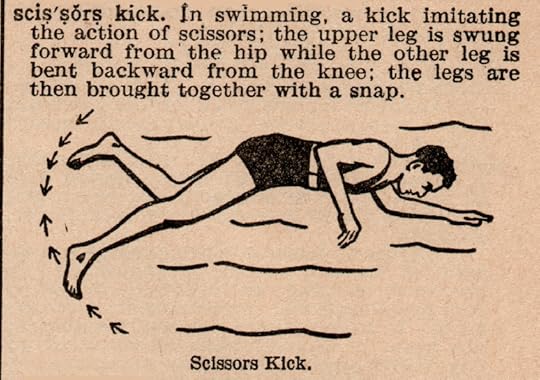
Filed under: Uncategorized Tagged: Lake Nokomis, Minnesota, raising awesome girls, raising good boys, Swimming lessons, Water


July 17, 2013
When my son grows up, I hope he is like his dad. If not, I hope he is like this guy.
The other day, while at the train station, my sister-in-law saw a bunch of college age dudes checking out the posterior-region of my thirteen-year-old child. “I just didn’t know what to do,” she told me. “It was so galling and so totally out of the realm of what I expected. I felt torn between wanting to tell them off and wanting to usher my beautiful niece as quickly as possible out of the vicinity so that she wouldn’t ever know what happened, and wanting to kick them all in their respective groins. I chose the middle thing.”
(I told her about a similar instance where I ducked behind my innocent child, looked the offending onlookers straight in the eye, gave them my laser-beam stare, and gave them the ole double-middle-fingers. These men were my age. They, suddenly realizing how young the girl at my side actually was, turned beet-red and skedaddled.
We didn’t know, their faces said.
Fuck you, said mine.)
Here’s the thing. In my younger years – on the 21 bus on Lake Street in Minneapolis during high school, at parties and on the job and once even during a professor’s office hours during college, on airplanes and in bars and walking home late at night and again on the job in my twenties, and even at professional conventions in my thirties – I have been subjected to groping, oggling, propositioning, butt-grabbing, space-invading, unwanted pick-upping, cat-calling and even scary and gross insistence (You know you want this, he said. No I do not, I said. Then why are you – OUCH! he said. And then I didn’t need to say anything at all.). It happens. We all know it happens.
To cope with these things I have used a variety of tactics – my fists (twice), my feet (a lot - I am fast), my sharp tongue (in both English and halting Spanish! And once in very bad French! Hooray for lingualism!), my clever maneuvers and quick thinking, and once, the very lucky appearance of a bus.
In my teens and twenties, my body was a liability. A vulnerability. I was not my mind. I was not my accomplishments. I was not my life. I was not my friends or my ideas or my care or my love. I was flesh and breast; I was lips and hair. And nothing else. The world that I loved was full of threats. And it made me angry. This has been true in my thirties as well, though less so, primarily due to circumstance. I live with a good man who is wildly in love with his wife, and associate primarily with good people of both genders with whom we collectively care for our children and trade stories and share food and love our respective spouses. It’s a good life, and I don’t venture away from it all that often. There’s a benefit to not getting out much. I had one horrible experience with an editor at a SFF convention (there was luring, there was a conversation that I thought was platonic but apparently was not, there was a sudden shirt removal and a lot of explosive chest hair and a proposition and a very astonished mother-of-three who had no idea how to respond. Of course I didn’t. I was out of practice), and it makes me reluctant to leave the safety of my neighborhood, to be honest.
But my safety is no longer my main concern. Now I have daughters. And I have to warn them.
We train our daughters to be street smart and tough. We train our daughters to be aware, to know the escape routes of any room, to have a buddy, to protect and protect and protect. We tell our daughters that this is the world we live in. It sucks sometimes. Be tough and be tougher. Find your allies. Make a battle plan. Know the weak spots. Fight.
My oldest left earlier this summer for a three week summer camp. She was going to be in a dorm, in a college. I’ve been to college. I know what goes on there. So we had to have Conversations. The first one was called “Why You Should Never Leave Your Drink Unattended”. The second one was called “The Buddy System – Not Just For the Beach!” The third was called “How to Know When to Knee a Boy in the Gonads: A Primer”.
And it breaks us to tell our girls these things. It breaks us in half.
Lately, my beloved SFF community has been in some intense conversations about harassment and autonomy and the rights of any individual to feel safe in their environment. Since I have been limiting my time online, I have missed much of these conversations, but they continue, and they deepen and they are important. Folks have been talking about respect and consent and have been outing serial harassers. A bright light now shines on bad behavior – which is good because bad behavior can only be addressed when it is named, clarified and known. People can learn. They can become aware of their privilege. They can change. I truly believe this.
There was the ugliness at Wiscon and then the attacks on N.K. Jemison after she (rightly) called Theodore Beale a sexist and racist a-hole, and then of course this little brouhaha. It makes me tired, is what.
Then, my darling Genevieve Valentine wrote a piece called “Dealing With It”, which I would urge all mothers to read, and to give it to their daughters. If my daughters are as tough as Genevieve, I will have succeeded beyond my wildest imaginings. And the overwhelmingly positive feedback she’s gotten from the piece is telling, I think. We’re all of us dealing with it. And sometimes we have to push back with all our might just to stand still. And sometimes that’s a colossal success.
But then I look at my son, and I wonder what kind of man he will be. How aware is he of his privileged status in our culture? How can I, as his mother, train him to be conscientious and kind, generous and brave, to use his strengthened position to do good in the world and to stand up for others? How does he resist being the guy who takes up more space, who uses more resources, who operates with impunity just because he can? Because we have all met that guy. And nobody likes that guy.
Which brought me to this gentleman, who wrote this piece: “Changing the Creepy Guy Narrative.” Stop what you’re doing and read that piece. I have printed it out and made a file called “Things To Show my Son”. This is not to say that we should all start sexually harassing the sexual harassers (though it does make for good blog posts), but it is to say that we have a voice. And our voices matter. And my son has a voice too. And I hope he uses it.
How can we, as thoughtful citizens, shine a light on obnoxious behavior? How can we call wrongdoers to task, identify and clarify bad behavior, and insist on change?
We can’t force change. But we can insist. There’s a difference. John Scalzi is insisting. So is Tobias Buckell. So are a lot of people. And so am I.
Filed under: Uncategorized Tagged: equality, Father, feminism, harassment, Mother, raising awesome girls, raising good boys


June 27, 2013
On cutting, and revising, and hanging on, and letting go.
For those of you who have followed me on Facebook and Twitter, back when I used to be on Facebook and Twitter (I am still on the latter, officially, though the only tweets currently are the automatically generated blog post alerts from WordPress. My computer prevents me from accessing the site until September. Because my computer is bossy. Which is to say, my thirteen year old daughter is bossy, because she was the one who set it up.) you may know that I spent the spring engaged in a grueling editorial process with my upcoming novel The Witch’s Boy. This was through no fault of my beloved editrix Elise Howard, who is brilliant and amazing and right about everything.
This has everything to do with me. And with the work of novel production, and novel refinement, and novel discovery, and novel re-discovery. And, believe me, it is work.
Revising a novel is building a granite castle. And then taking it apart and building it again. By hand. By yourself. And then, when you’re done, you run a marathon. Barefoot. While carrying a very heavy and very ill-tempered goose. It’s kind of exactly like that.
Revising a novel is a return to a garden that you planted a while ago – one that you know is loaded with vegetables, but you cannot see them because the weeds now tower, jungle-thick, over your head.
Revising a novel is that colicky baby that will not go to sleep no matter what you do.
Revising a novel is the thick, muddy traverse through a swamp, only to realize that you have to climb a cliff on the other side. And you forgot your rope.
Revising a novel requires the skin of a rhinoceros and the strength of a bull and the delicacy of a jeweler.
Revising a novel feels like performing open-heart surgery. Without anesthesia. On yourself.
Revising a novel requires you to heft a thousand-pound boulder, sling it onto your back, carry it up a mountain, and balance it on the head of a pin.
Which is to say that revising a novel is effing hard.
And that’s the case generally, and in the case of The Witch’s Boy, it is even more so. This book is incredibly close to my heart, and was often emotionally exhausting to write. I have always loved my characters, but, in this novel, I - for real - love these characters. Partially because I didn’t come up with them on my own. This story began, very long ago, as a story that my son and I told one another during a particularly grueling hike through Shenandoah National Park when he was only six. There is a lot of Leo in Ned. There is a lot of me in Aine. And Sister Witch. And the Bandit King. Hence my struggles.
Also, there’s something about working with a new publisher – it’s exciting and inspiring and energizing, but also nerve-wracking. Because we want to get it right. And we want to make people happy with us. And we want to not suck. This is the way of things.
So I worked my bum off, took three months to write two crucial chapters that were going to re-imagine and re-focus the larger arc of the novel, allowing the choices and action to flow from a single nexus point where my main characters converge, bear witness, keep silent, and irrevocably change their trajectories.
Three. Long. Months.
And….maybe it worked? We’ll see.
Anyway, apparently, in the last revision, I managed to grow the novel by ten thousand words. And that was after some major textual excising. Which explains a thing or two.
And now I am, once more, into the brink. I have tools. I have a map. I have my dear editor sounding her trumpet and spurring me onward. I have a lantern. I have a sword. I have a pure heart and a just cause and a mind on fire. I have characters to rescue. I have giants made of stone. I have a stalwart wolf and a ferocious girl and a boy who does not know what he is capable of. I have my heart and my brain and my love, and I hope it will be enough.
Anyway, I will be posting some out-takes here and there.
Like this:
He was alive. For now.
“Ha!” a man said, shaking his fist at the water. “It won’t be taking this one, by god. Only one victim for that blasted river.” He gave the river a hard look. He did not help the father, nor did he touch the boy. Everyone in the village knew that those marked for drowning were cursed by nature. The river was a greedy thing. And foul-tempered. It would have that boy eventually. This was common knowledge.
And this:
This was not magic. This was a simple practicality. Witching, after all, is tricky work. And complicated. She had learned, after all these years, to see the world from the inside – its foundation and its beams, its braces, insulation and gaps. She knew the weak places. She knew how lean against the fabric of the world and nudge it this way or that. She knew how to make suggestions. Anyone could do it, if they ever learned. But people called it magic, and conflated it with her real magic, and Sister Witch didn’t correct them.
Her real magic was dangerous – capable of great good and great evil in equal measure. It was work keeping it good. It required a firm hand and an iron will. Best to use it sparingly, if at all.
And this:
The ladies from the village came in droves. They descended onto the grieving house like an army of magpies, all feather and gossip and claw. Sister Witch thought she’d never be rid of them, and suffered the indignities of grief in relative silence.
“It’s a pity,” the magpie ladies simpered. “Such a terrible pity.”
Go away, Sister Witch seethed.
“And on such a beautiful day,” as they munched on the pastries they had brought for the family.
She thanked her visitors for their meat pies and fruit pies and custard pies and pies she could not identify or name. She thanked them for their pots of stew and their legs of lamb and their heavy rounds of hard cheese. Their gifts were thoughtful, tender, and full of wiles.
They were gifts that asked questions.
Sister Witch had no intention of answering a thing. Her son, Tam, was dead. Her magic could not save him. And that was that.
Here’s the thing: it doesn’t matter how deft your hands may be, or how sharp your scalpel or how cunning your eye. Cutting away bits and pieces of our novels – fingers, toes, tumors, tongues, unsightly moles or pounds of pulsing flesh – well, it hurts.
A lot.
And because I hate being alone and wallowing in psychic pain, I turn it over to you. Any sections that you’ve cut lately? Any extraneous scenes that simply detracted from the central pulse of your novel – that single, beating heart? Paste it here and share! Our amputated novel bits can assemble and congregate. They can bind together into hideous and beloved homunculi. They can resuscitate, respirate, ambulate, and live.

Here is Faust and his homunculus. It worked for him, right?
And it will be beautiful.
Filed under: Uncategorized Tagged: Algonquin Books for Young Readers, Facebook, fantasy, Faust, fiction, homunculus, Middle Grade Novels, the writing process, Twitter, Witchcraft, Wordpress


June 23, 2013
And then they fly away.
This morning, we got up at four in the morning, ate, made tea, and hauled suitcases out to the car. I wrapped my arms around my thirteen-almost-fourteen-year-old girl-child and pressed my cheek to her ear. I curled my fingers around the globe of her skull. I smelled her hair and held her ponytail in my fist.
“Mom,” she said. “You’re crying again.”
“No I’m not,” I said, scooping a bucketload of tears from the hollows under my eyes.
My husband and I couldn’t both go to see her off because of the rules governing unaccompanied minors on airplanes (you can take your kid to the gate, but you must do it alone, and you must watch the child of your body go careening into the sky alone, and you must walk the lonely corridors of the airport alone. This is your fate.) so my husband went instead of me. I said goodbye in the kitchen.
She is scared. She is excited. She is both.
I am sending my firstborn infant into an airplane. And she will go off to camp for three weeks – three weeks! – with a bunch of other smarty-pantses at the Center for Talented Youth at Johns Hopkins University and she will learn Cryptography. And she will probably get recruited by the CIA or some other spy organization that I have never heard of and I will never see her again. And she will sleep in dorms and eat in the cafeteria and talk to boys whose mothers I do not know.
And my heart is broken in pieces.
I prefer my children to stay on the ground.
I also prefer that they stay in their rooms and never grow up.
Both of these things are an impossibility.
Every day she becomes the woman that she will be, and every day she becomes more and more herself, and every day she leaves me behind. This is the way of things. Our children do not belong to us. They belong to themselves. And they belong to the world.
I just hope the world is grateful. Because, damn. That girl rules.
(And oh! I miss my girl.)
Filed under: Uncategorized Tagged: Center for Talented Youth, John Hopkins University, parenting, raising smart girls


June 21, 2013
On Vanishing, Precious Things.
Lake Nokomis Beach, remaining its awesome self.
I had the best day today. I am sick with grief. Both are true.
It is Friday. I am covered in sand. And I am sunburnt. The sand will flow away down the drain and the sunburn will fade and fade. I am trying to hang onto something. This day. This afternoon. This sunlight and sand. Children in the water. The smell of sunblock. The screech of their voices. The shimmer of skin. Their hard-muscled bodies launching into the sky.
And I am getting ahead of myself.
My daughters left just before lunch to do a bible study with their grandpa (it is one of his great joys at this stage of his life: those two beautiful girls; the mysteries of the Universe bound in text and paper; the certainty of limitless love) and my son and I were left to our own devices. We had already had breakfast, made banana bread, explored the storm damage along the swollen creek and looked for frogs.
“I’m bored,” Leo said the second the girls left.
“Let’s walk to the beach,” I said.
He looked at the sky. It was still gray and damp with a little bit of post-storm chill lingering in the air. “Really?” he said. Then he shrugged, slid into his swimtrunks and we walked to the lake.
(I am trying to cling to something precious. I cannot hold on. It vanishes the moment my fingers clasp around it. I am grasping at smoke; I am trying to snag starlight with a string.)
We were the only ones there, save for three lifeguards who lounged on the grass reading novels. One sighed as we arrived, hoisted himself off his blanket and summited the guard chair. The sky was gray. The lake was gray. A mama duck shepherded her bright-tufted babies through a red-buoy obstacle course. Leo eased himself into the waves.
“It’s cold,” he complained.
“Come in if you’re cold,” I said.
“No. I like it.”
The water at his knees. His trunks. His belly button. The water lapping his shoulders, then his neck, and then he was swimming, every once in a while shooting me a gleam of teeth over the wave.
“Do you see me mom? Do you see me?” A spurt of water. A joyous splash.
Of course I see you. You’re the only kid here.
We planned to stay for an hour at most. But the sun came out and the day grew steamy. And then kids from the neighborhood showed up. Kids that I have known since they kicked in their watery worlds within their mothers expanding middles. Kids who I love as much as my own. And their mothers, who I also love.
An hour became two.
Then three.
Then three and a half.
The children covered themselves in mucky sand. They wrestled in the mud and grass. They washed themselves new and clean in the water. They swam out to the diving dock and plunged into the deep again and again. They were bright birds, slippery fish, creatures made of fire and water and star. They were magic things.
Do you see me?
Of course I see you. You have swallowed the Universe. My eyes are your eyes and my skin is your skin and my heart is your heart. It will be so until you go into the wild world and leave me behind.
(I am grasping at vanishing things. Each moment is like a bead of water on sun-soaked skin, each ghosted remains scattering like dusty pebbles on a dry, dry river bed.)
I smiled and waved and swallowed a sob.
On the walk home, he took one step for every two of mine. He was barefoot, shirtless, holding his towel to his shoulders like a cape.
He asked about different kinds of rocks. He wanted to know the difference between a paleontologist and an archaeologist (he wants to be both when he grows up). He told me the story about a flying dog who fights crime and who shows up in his dreams most nights. He wondered about june bugs. He wanted to know if he could go to college with his two best friends. He wondered if it was possible to hold your breath for a year.
We scanned the sidewalk for lost pennies and priceless artifacts. We estimated the weight of dinosaur bones. I rested my palm on his thistledown head. He let me keep it there. He smelled of sun and algae and sunblock and boy.
“Did you have a good day, buddy?” I asked.
“I had the best day.”
“The very best?”
“Of course. I always have the very best day. Don’t you?”
I wound my hand in his hand and held on tight.
“I do believe I do, buddy,” I said.
And I swallowed a sob.
Filed under: Uncategorized Tagged: family, Lake Nokomis, nature writing, parenting, raising boys



